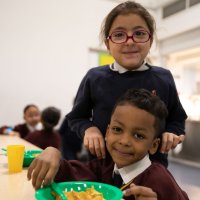Introduction
Background to the Annual Breakfast Survey: Making mornings matter
The impact of a school breakfast provision
A school breakfast gives children and young people more than just food
The case for school breakfast provision
Schools are supporting families more than ever and it can start with breakfast
Spotlight on SEND/ASN and early years
A focus on the unique impact of breakfast in certain settings
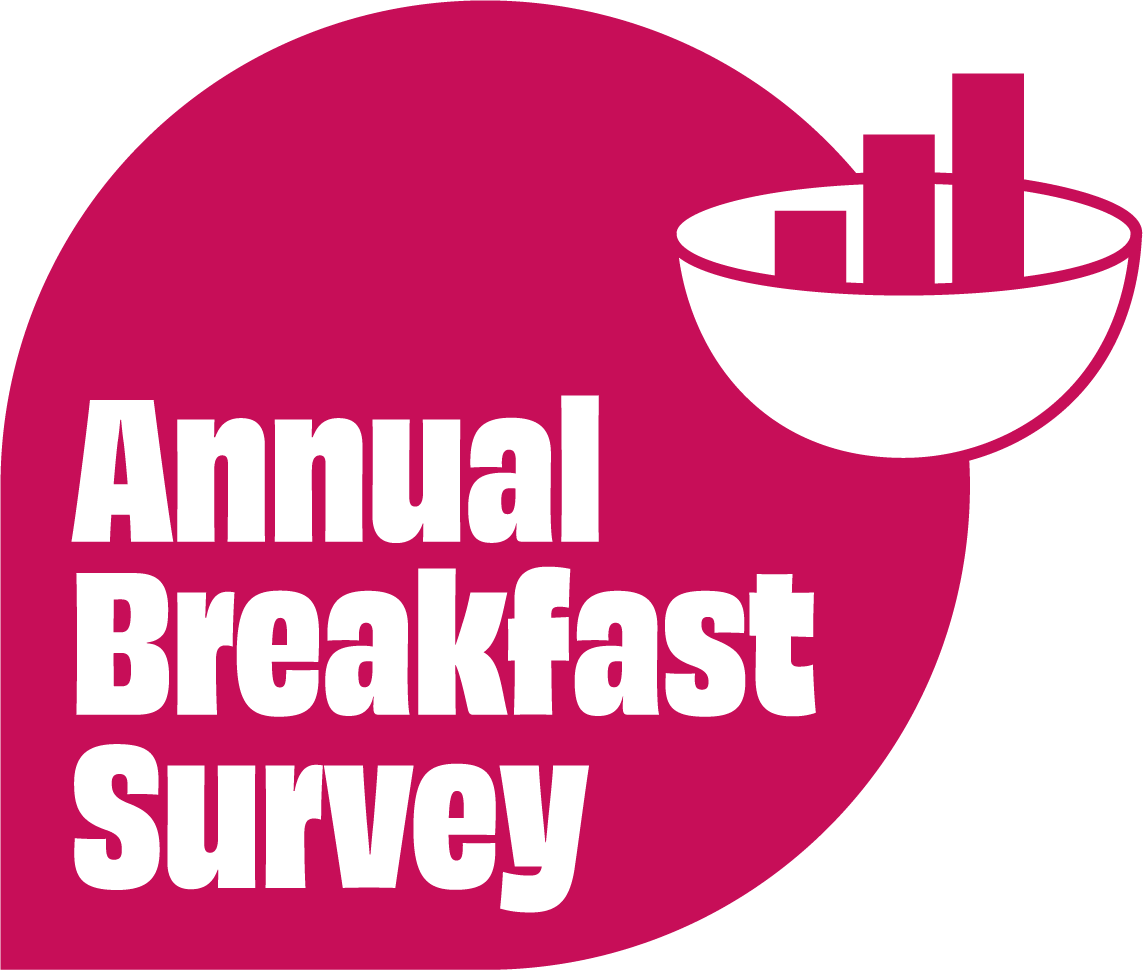
Making mornings matter
Each year, we ask our partner schools about the biggest challenges they and the wider school community are facing, and how Magic Breakfast is making a difference for their pupils and families.
The findings are clear. Schools told us that breakfast can make a big difference for children and young people who come to school hungry – it gives them the energy to learn, and helps them feel happier and calmer.
But a Magic Breakfast is about more than just food. When school breakfast works really well for everyone, you can see the impact far beyond the breakfast bowl and across the whole community.
94%
of schools agree that Magic Breakfast positively impacts pupils’ readiness to learn
93%
of schools believe that a great breakfast provision is about more than just food
89%
of schools agree that Magic Breakfast reduces pressure on families’ budgets
When school breakfast is available for everyone, without judgement, more pupils are in classrooms, on time and ready to learn – not distracted by hungry tummies.
When schools can offer breakfast in a way that works best for everyone, it becomes a chance to build a strong, inclusive school community.
And when children and young people are offered a variety of high-quality foods each day, they feel valued and begin to develop healthy-eating habits.
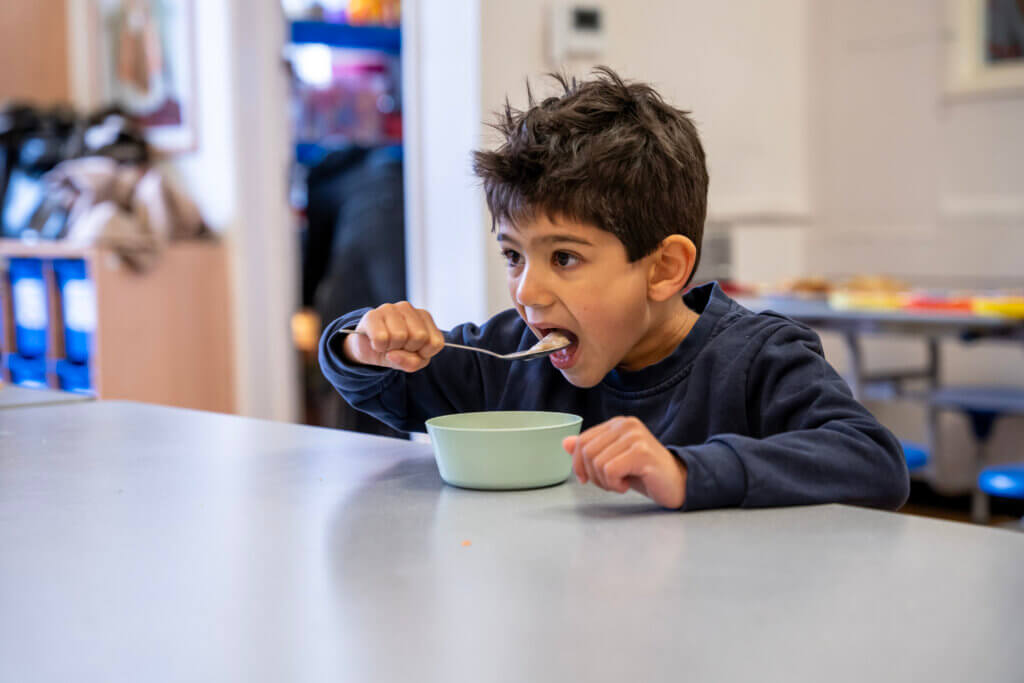
Listen to a summary of this year’s survey, as told by a 7 year old pupil
Pupil at a Magic Breakfast partner school
“Having breakfast at school makes a huge difference. It gives me the energy to get through tough classes and the chance to connect with friends before lessons start. It’s helped me feel more prepared and less stressed.”
Families benefit too. Knowing their children have a healthy breakfast at school can ease stress, and for some, make it easier to work.
All of this is especially important right now. 9 in 10 schools told us how the effects of a higher cost of living, poverty and not having enough food are making it harder for children and young people to do well at school and reach their full potential. Families are also struggling to provide the things their children need, like food and clothing.
In response, schools are having to help more pupils and families in more ways with learning and beyond – and Magic Breakfast is one way they can do that.
Magic Breakfast partner school
“It’s about ensuring every child no matter their background starts the day with a full stomach, a warm smile, and a sense of possibility. That’s what makes Magic Breakfast truly magical.”

Some of the good things a school breakfast can do are hard to measure. This is especially true for learners with special educational/additional support needs (SEND/ASN) and children under 5. Our Spotlight section shows how a Magic Breakfast can help in ways we don’t ask about in our Annual Breakfast Survey.
Making our work possible
Thank you to all the schools who gave their time to this research.
Thank you to players of People’s Postcode Lottery, whose generous support made this research possible.
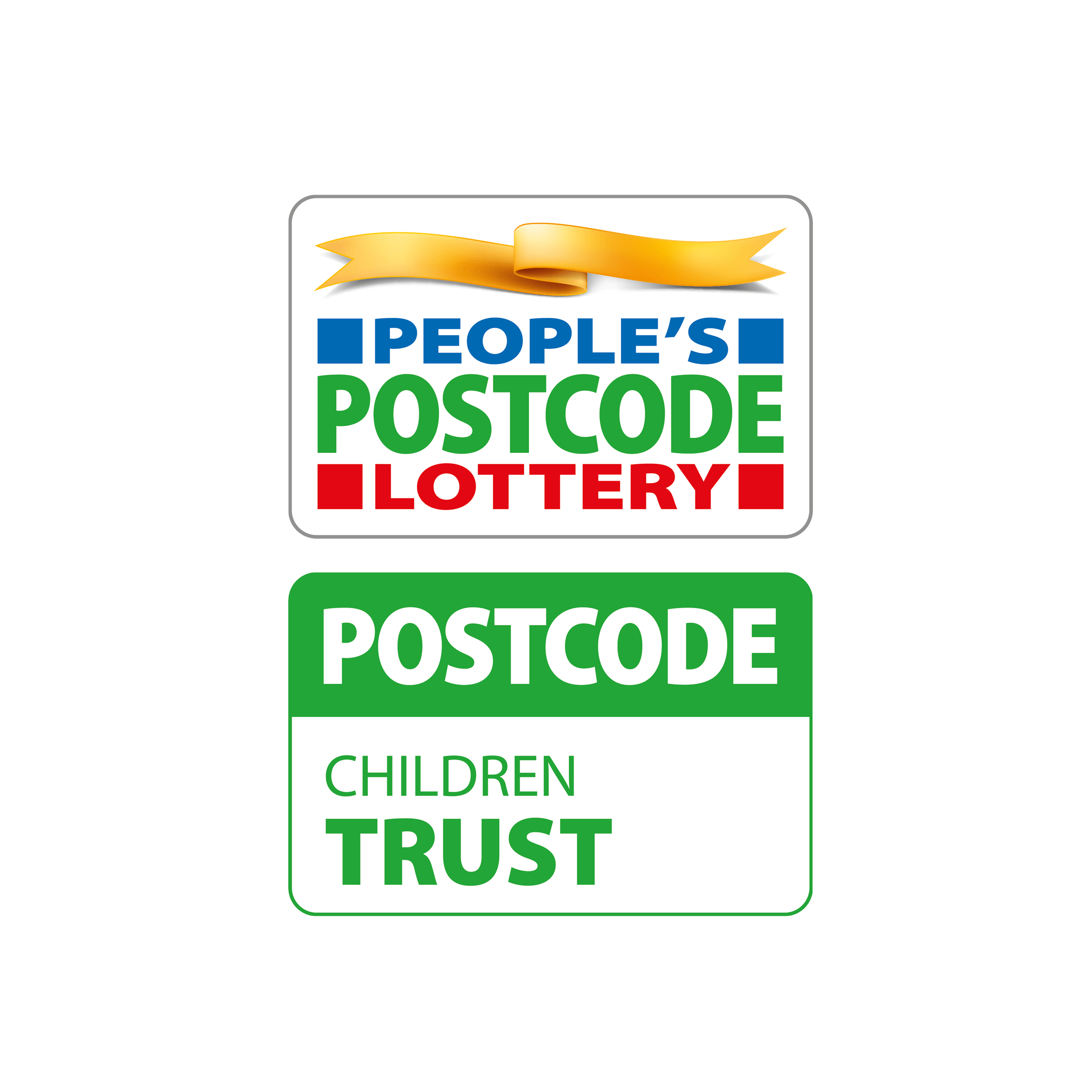
Anchor
A school breakfast gives pupils more than just food
Schools told us about the big difference having breakfast can make for children and young people who come to school hungry.
95% of schools agree that eating in the morning gives pupils energy. This helps them get ready to learn and stay focused in class for longer. Having breakfast also helps them feel happier and calmer. More pupils come to school every day and arrive on time to eat breakfast, especially primary-age children. 88% of primary schools in England told us breakfast helps improve attendance and punctuality compared to 79% and 80% in English secondary schools. All of this helps them do better at school.
We asked schools how breakfast impacts their students and families. Then we calculated the percentage that agreed breakfast had a positive impact on the following outcomes:
When school breakfast works really well for everyone, you can see the difference all around a school.
We support our partner schools to provide a universal, stigma-free breakfast, so every child and young person can have a breakfast at school without being judged. Schools told us that when more pupils are in classrooms on time, calm, ready to learn, and not distracted by empty tummies, teachers have more time to teach.
Magic Breakfast partner school
“[Magic Breakfast] removes the inequality that food poverty can create.”
76%
of schools agree a breakfast provision reduces inequalities between pupils
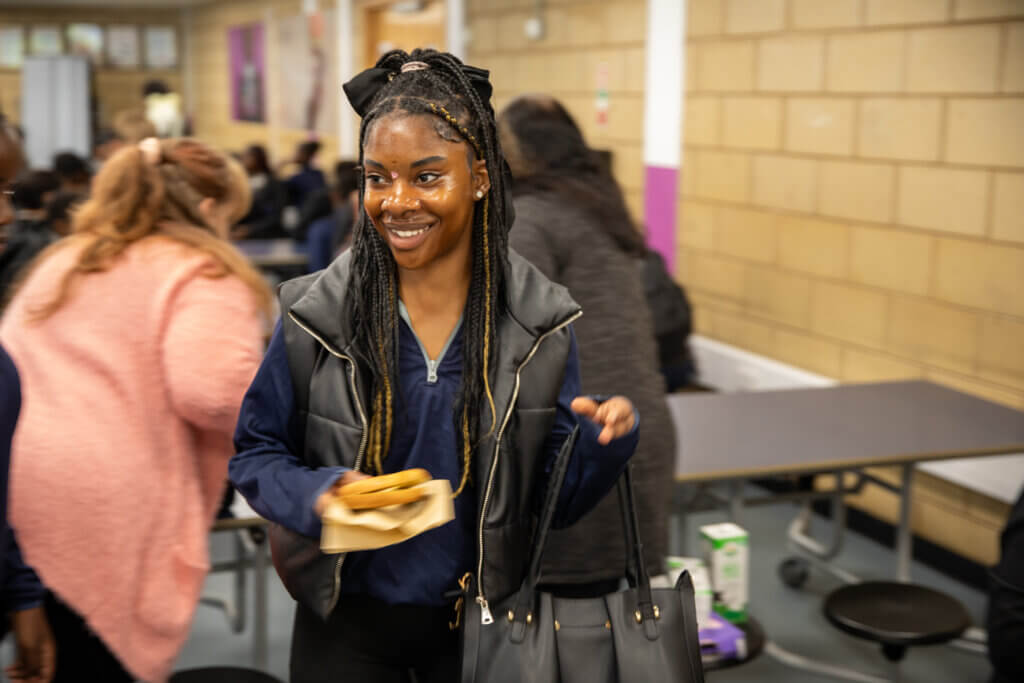
Listen to a pupil talk you through the various impacts of Magic Breakfast
Magic Breakfast partner school
“The difference is remarkable. Children come into class ready to learn instead of distracted or upset. It’s created a more positive atmosphere, not just for the children who were hungry, but for the whole class.”
We help our partner schools to offer breakfast in a way that works best for them and meets the needs of their community. Almost all our schools told us that they offer breakfast in more than one way. This might be to grab and go (such as a bagel basket at reception), through a breakfast club or served in classrooms. This supports schools to build a strong, inclusive community, because breakfast isn’t just about food.
Breakfast is a safe, warm and friendly way to start the day. It’s a time for children and young people to be together and get to know school staff. Some pupils come to school early just to see their friends and play games before lessons begin – 86% of schools told us that school breakfast improves social skills. Pupils enjoy being welcomed with a smile, and school staff can use this time to check-in on anyone who might need a bit of extra care.
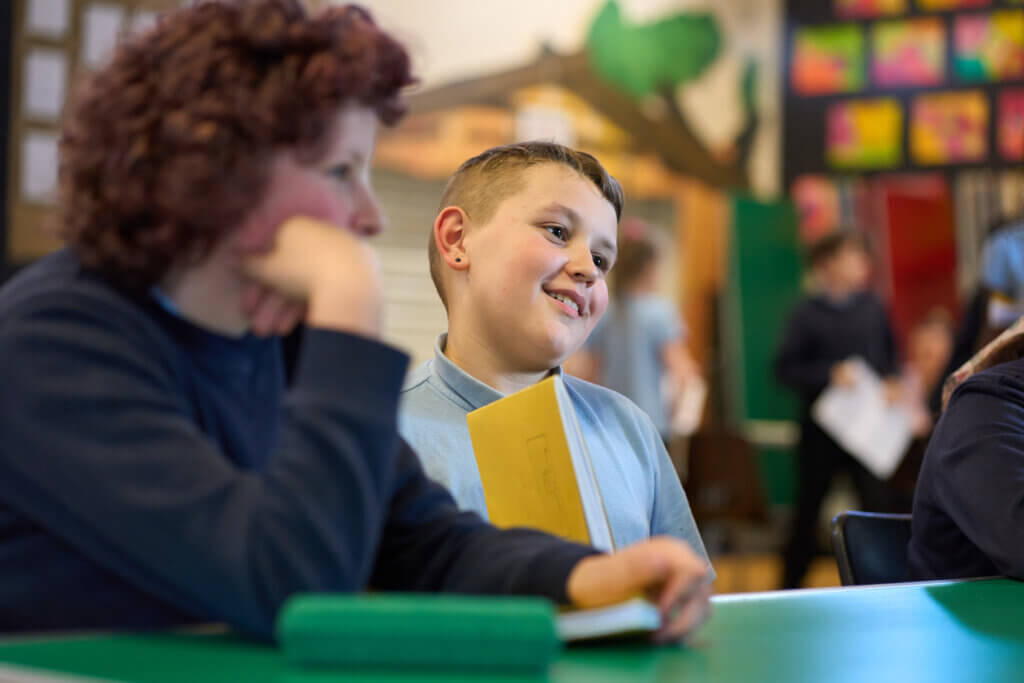
Pupil at a Magic Breakfast partner school
“Guaranteed I know that I am going to get breakfast. If I am running late for school, I know that breakfast club is always there. I like to see my friends and the welcome in the mornings from the staff really helps to boost my day.”
Magic Breakfast partner school
“[Breakfast Club] gives children a calm, positive start to the day where they feel welcomed, cared for, and part of the school community. Breakfast is often the first point of connection between staff and pupils each morning. It allows for informal chats, a check-in on how they’re feeling, and a chance to build relationships outside the classroom. For some children, it’s the most stable and consistent part of their morning.”

Eating breakfast together also helps everyone feel like they belong and are part of the school family – 79% of schools said that school breakfast improves pupils’ sense of belonging.
Magic Breakfast partner school
“The quality of the produce is second to none. We used to buy in the cheapest brands which were not always well received by pupils, What Magic Breakfast provides is high-quality, long-lasting produce that is really popular with all.”
Parents like that they don’t have to worry about breakfast when they have less money for food or when mornings are busy – 89% of schools agree that a school breakfast reduces pressure on family budgets. They feel good knowing their child has had a healthy meal to start their day. For some parents, especially with primary-age children, it helps them get to work on time.
All these great things about school breakfast help children and young people feel happy, do well at school and break down the barriers to opportunity to succeed in life. It can also make things a bit easier at home at a time when families are struggling.
We also make sure that we offer our partner schools a variety of high-quality food, supported by our corporate partners including Arla, Heinz, Kellogg’s, New York Bakery Co., Quaker, Warburtons and Weetabix.
Schools told us that pupils enjoy having different foods to choose from, and having well-known brands that they might not get at home can help them feel special and cared for. It helps them try new things and encourages healthy eating habits that can last a lifetime – 85% of schools told us that healthy eating habits can be developed through Magic Breakfast.
Parent at a Magic Breakfast partner school
“Before the breakfast club, mornings were chaos. I had to choose between getting to work on time and making sure my kids had food. Now, they eat at school, they’re happier, and I don’t feel like I’m failing them.”
Anchor
Schools are supporting families more than ever and it can start with breakfast
9 in 10 schools told us that a higher cost of living (98%), poverty (96%), and not having enough food (93%) are making it harder for children and young people to learn and do well at school. They also told us that hunger and access to food was the third biggest barrier to learning and success for their pupils. This is because families are struggling to provide the things that their children need, like food and clothing. This can be difficult even for parents who are working.
We asked schools about the issues affecting their pupils’ learning and overall success. We calculated the percentage that identified each of the following factors:
Magic Breakfast partner school
“Children [are] coming into school without breakfast, suitable clothing or basic hygiene.”
More children and young people now rely on free school breakfasts and lunches as their main meals. Some come to school hungry because they haven’t eaten since the day before. Snacks and packed lunches can be smaller or less healthy if families are trying to save money.
It can also be hard for families to pay for new clothes and shoes when old ones don’t fit anymore, get worn out, go missing, or when the weather changes. Some pupils also come to school in dirty clothes.
Many families live in homes that are too small, crowded, or not safe. Some children and young people don’t have a clean or comfy bed to sleep in (“bed poverty”), and problems such as mould can also make families feel unwell.
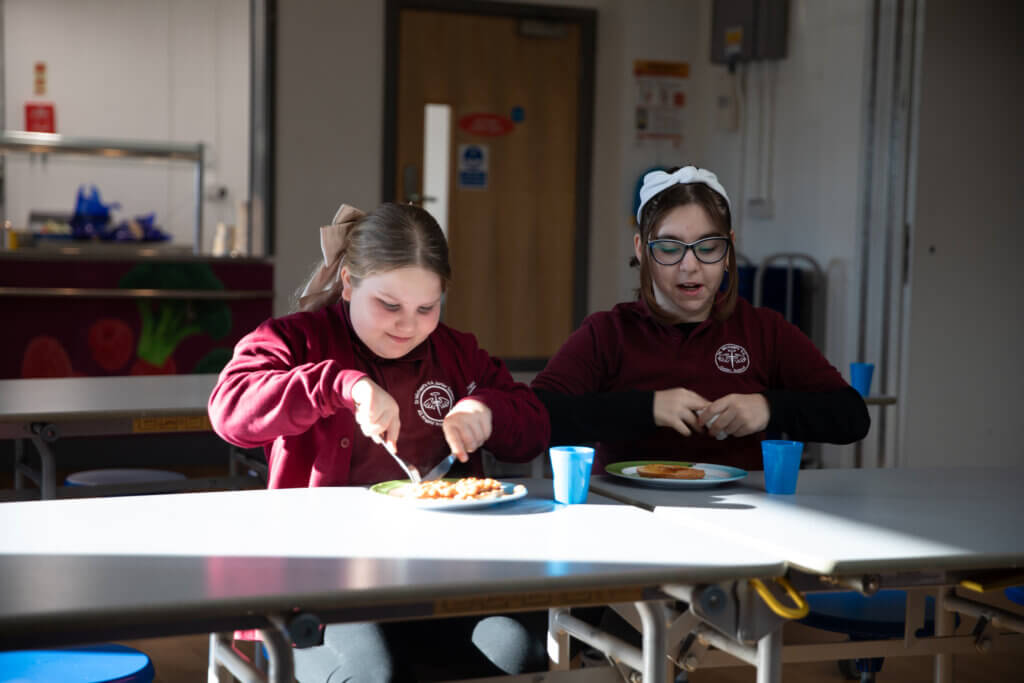
Pupil at a Magic Breakfast partner school
“Sometimes my breakfast and school dinner is all I will eat in a day.”
All of this can leave parents feeling stressed or sad, and makes it harder for them to help their children with learning. Fewer pupils go on school trips or take part in after-school activities, and some can’t do homework as they don’t have a computer or internet at home (the “digital divide”).
The effect of poverty on a child or young person’s school day can therefore be devastating and could damage their future prospects. Some go to school less often or arrive late. This can be because travel costs are too high, or families are moved further away from school. 89% of schools believe attendance and punctuality affects how well children and young people do at school.
Magic Breakfast partner school
“Morning hunger steals a child’s focus, dampens their energy, clouds their emotions and widens the gap between potential and performance.”
In response, schools are having to help pupils and their families with more than just learning.
Schools told us they are getting more requests for food and food bank vouchers, especially during the school holidays. They are also helping with school uniforms, asking other services like Early Help to support families, and spending more time helping children, young people and their families feel safe and well.
We know that helping families with more than just learning can start with a school breakfast.
When they are at school, more pupils are feeling tired or struggling with their mental health, often because of things happening at home – over 90% of schools believe that energy levels and mental health affect how well pupils do at school.
Starting the day hungry makes things even harder. Children and young people who haven’t had breakfast can find it difficult to stay awake, join in with lessons and concentrate in class. Hunger affects mood and behaviour too. This can all have a big impact on how well pupils do in school, including their exam results.
Magic Breakfast partner school
“The school has had to take on a greater role in providing pastoral care and practical assistance to ensure that children are safe, supported, and able to access learning.”
Anchor
Spotlight on the impact of breakfast: learners with SEND/ASN and in early years settings
We know that breakfast doesn’t just stop children and young people from feeling hungry, it helps in lots of other ways too. But sometimes, it’s hard to show this with numbers. This is especially true for learners with special educational/additional support needs (SEND/ASN) and children under 5, where things like test scores or how often they come to school don’t always show the real difference breakfast makes.
For learners with SEND/ASN and children under 5, having breakfast at school is a special time to play, learn new things, and practise important skills. It helps them get ready – not just for the school day, but for the future too.
Right now, it’s important to talk about all the good things a school breakfast can do – even the ones that are hard to measure. This is because the plan for free school breakfasts in England is for primary-aged children only. This means that children in early years settings and secondary-aged learners with SEND will miss out on the difference having a breakfast can make.
Our wonderful partner schools have told us about the benefits of a Magic Breakfast for learners with SEND/ASN and for younger children, which go beyond those we ask about in the Annual Breakfast Survey:
It offers a calm and supportive space to settle after the journey to school, helping to meet sensory needs.
It’s a chance to practise practical life skills like cooking and cleaning – experiences that can spark future aspirations, including jobs in catering or hospitality.
Chatting with friends and staff, and joining in with a group routine, supports social development.
Choosing and asking for food builds communication and personal skills.
Physical skills are strengthened through handling food and trying new tastes and textures.
When learners help to run breakfast, they build confidence, independence, and a sense of belonging.
In some schools families are also invited to join breakfast, giving parents and carers the opportunity to learn new skills alongside their children too.
In SEND/ASN settings, breakfast appears to have a bigger impact on some outcomes than we see in mainstream schools:
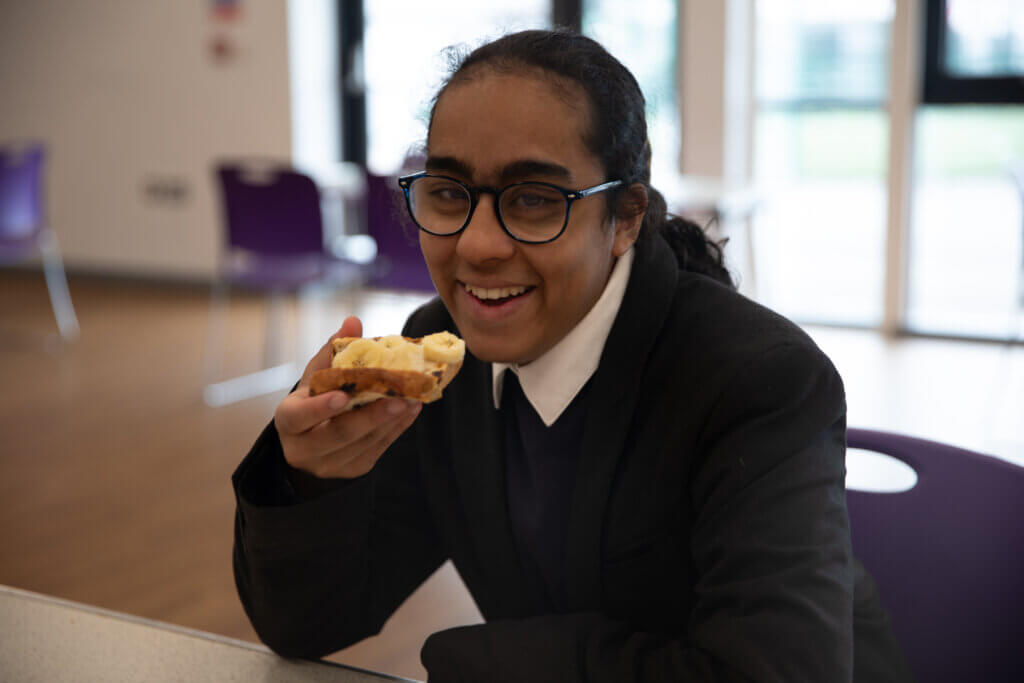
Magic Breakfast partner SEND school
“The socialising, turn-taking and independence skills that students learn are highly impactful. Students learn simple tasks and routines such as waiting and manners.”
3RD
Improving social skills is the 3rd biggest impact of breakfast in SEND/ASN schools, compared to 8th in mainstream schools
Listen to how our partner schools use Magic Breakfast to develop social skills
Breakfast appears to have a bigger impact on life skills in SEND/ASN schools than in mainstream settings.
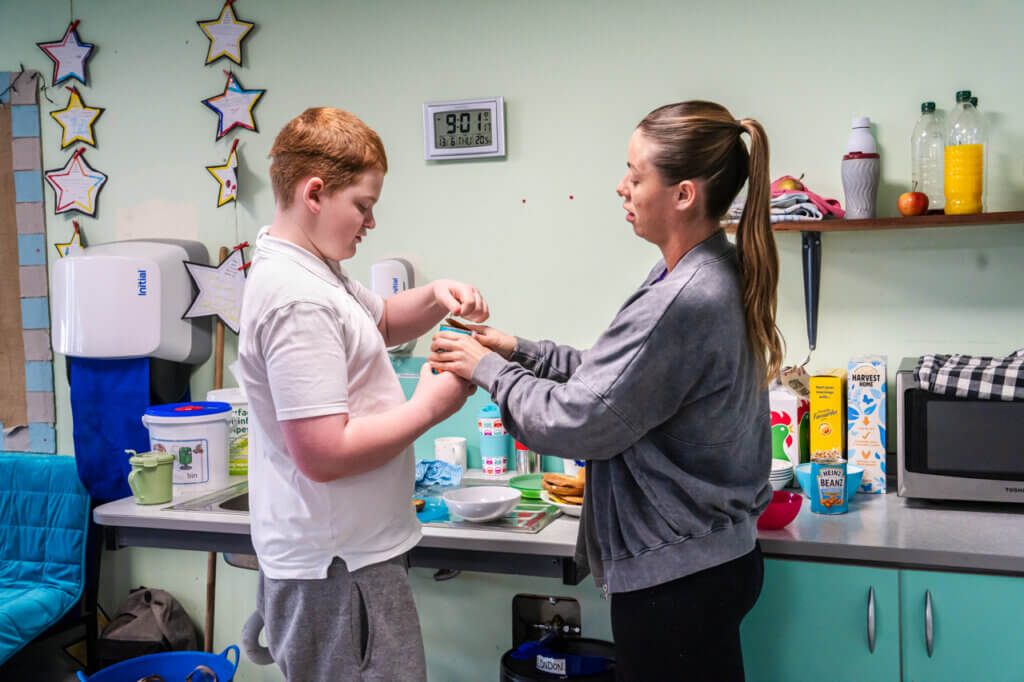
Holly O’Connor, Pupil Support Officer, Kaimes School
“One of our 14 year olds didn’t know how to butter a bagel six months ago, now he’s making bagels for the whole class”
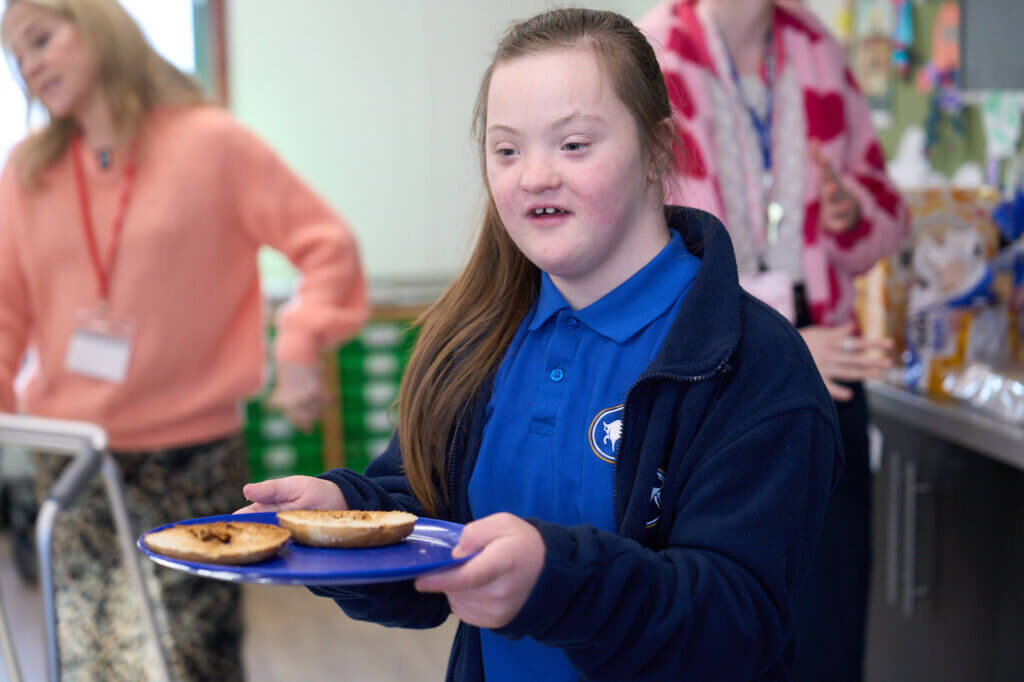
Magic Breakfast partner SEND school
“As an SEND school, trying new foods is very important. When the children see their friend trying something new they are encouraged to try it also.”
5TH
Improving healthy eating habits is the 5th biggest impact of breakfast in SEND/ASN schools, compared to 11th in mainstream schools.
Listen to how Magic Breakfast can help children and young people develop healthy eating habits
For younger children, breakfast time is a great chance to explore early years skills. They can make choices (personal development), talk about new foods (communication and language), and build fine and gross motor skills by pouring cereal or spreading butter on toast (physical development).
Sitting at a breakfast table with friends and staff also helps them learn how to share, take turns, and talk to others (personal, social and emotional skills, developing an understanding of the world).
Samantha Fish, Deputy Head, Northdown Primary School
“It’s teaching [early years children] those personal skills and also the understanding of community eating. So they’ll all sit down with their crumpets and eat together at the table – community crumpet time. It’s a social opportunity.”
Kellie Schrader, Headteacher, Somerset Nursery School
“It’s this extra opportunity for children to develop their independence skills and their self-help skills with eating. So actually sitting at a table using cutlery, using a spoon with their cereal.”
For families, it’s often their first introduction to the benefits of a free school breakfast. All of this helps children and families get ready for primary school, and it also builds good habits for a healthy breakfast routine that can last a lifetime.
Look out for our full reports on how school breakfast supports learners with special educational/additional support needs, and children in early years settings – coming soon!
What is SEND/ASN?
Some children and young people find learning harder than others because they have learning difficulties or disabilities. In England, these pupils are said to have ‘special educational needs and disabilities’ (SEND), and in Scotland, they are said to have ‘additional support needs’(ASN). This means they might need some extra help at school or different kinds of support to help them learn.
What are early years settings?
An early years setting is a place where young children are looked after and start learning before they go to primary school. Children can go to these places from when they are a few weeks old, to age 5. There are many different types of early years settings, like nurseries, pre-schools and nursery schools. Some are run by the government, and some are private. They can be different in how big they are, how old the children are, how long they’re open each day, and how much they cost families.
Breakfast is a time to spend together
Greenacre school is an all-through SEND school in Barnsley. Students have breakfast in their classrooms every day. On Thursdays, college students (aged 16-19) have ‘Big Breakfast’. This is a chance for to come together to eat in a calm, café-style setting.
The students help themselves to bagels, cereal and hot drinks. This helps them practice using their hands (fine motor skills) and get ready for cooking in the future.
Elaine Padgett, Pastoral Lead, Greenacre School
“If they live on their own in supported living in the future, they are going to need to know how to feed themselves. “
Big Breakfast at Greenacre is about more than just food. It’s also a time for being creative and spending time with friends. Students can chat, draw, sing, dance, or even play football with their classmates. This isn’t always easy for young people with complex needs.
Elaine Padgett, Pastoral Lead, Greenacre School
“These young people might not get the chance very often to hang out at a café with friends. This is a real opportunity for them to practice these social skills before they go out into the world.”
Breakfast led by champions
Kaimes School is an ASN school in Edinburgh. At Kaimes, breakfast is more than just food, it’s a key part of the day and the school helps children learn to do things for themselves.
Each classroom takes care of their own breakfast. They check their food supplies every week to make sure they have what they need. The students make their breakfast themselves using toasters and kettles in their classrooms. They even help clean up and wash the dishes after.
Every class also has a Breakfast Champion. They visit the breakfast club cupboard to get the food their class needs. One pupil, age 13, shared why he likes being a Breakfast Champion.
Pupil, age 13, Kaimes School
“I love it because I get to see people and talk to them. It releases the stress of every class having to sort their own deliveries themselves. I can just do them with my support staff. I enjoy spending time out of class helping people. […] it means I can move around the school instead of sitting at a desk, getting distracted, or into trouble.”
Kaimes also helps their students prepare for the future by giving them jobs at breakfast.
Holly O’Connor, Pupil Support Officer, Kaimes School
“We’re not just tick boxing. Not just solely focusing on qualifications […] we want to give them [our learners] the tools to be equipped to live their life the best they can.”
Breakfast helps learners try new foods
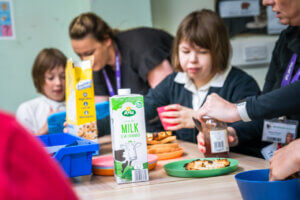
Pens Meadow is an all-through SEND school in Dudley. The students are at different stages when it comes to eating, and breakfast is a safe place for them to explore food. They can touch it, smell it, and even lick it before they try to eat it if they are able to and when they feel ready.
Sue Wale, Family Outreach Lead, Pens Meadow School
“[Our student’s] mother told us she only ate spaghetti Bolognese. [At breakfast] she ate a bagel … Now we’ve graduated from a bagel and she’s trying all sorts of fruits and everything! You can’t put a price on things like that.”
Sue Wale, Family Outreach Lead, Pens Meadow School
“We regularly invite our families in and we have a breakfast together. We do things like Makaton workshops, so that our families can take on board the communication that we do. [We do] anything that helps them in navigating their journey of parenting a child with SEND.”
The pupils sometimes try foods they don’t eat at home because they have this special breakfast time, the same food on offer every day, and help from skilled staff.
Pens Meadow also helps their students’ families. They hold workshops on topics such as sleeping, eating, and communication during breakfast time for parents to join.
Breakfast helps younger children get ready for school
Somerset Nursery School is a maintained nursery school in Wandsworth. This means that it is run and paid for by the local authority, and it is a school that provides early education.
For the young children at Somerset, having a Magic Breakfast means more chances to learn at the start of the day, and it helps them join in and stay interested throughout the morning. By helping them grow and learn, breakfast is getting the children ready for primary school.
In early years settings, there are more adults to help during breakfast time. The higher staff-to-child ratios means staff can spend more time supporting children as they explore those early years skills that the Government says are important for children from birth to age 5.
For the young children at Somerset, having a Magic Breakfast means more chances to learn at the start of the day, and it helps them join in and stay interested throughout the morning.
Children also feel calmer and more settled after eating a healthy breakfast, so they can learn for longer. By helping them grow and learn, breakfast is getting the children ready for primary school.
Kellie Schrader, Headteacher, Somerset Nursery School
“If they’ve got a full tummy of a nutritious meal, we can see that it is having a positive impact on their level of engagement and their learning. It just has a knock- on effect throughout the day and more learning happens.”
Breakfast helps children to feel part of the school community
Balham Nursery School and Children’s Centre is a maintained nursery school in Wandsworth. This means that it is run and paid for by the local authority, and it is a school that provides early education. They haven’t been with Magic Breakfast for long, but breakfast is already an important part of the day, helping everyone feel part of the school community.
Most children arrive for 9am, and go straight to the breakfast table. Children of all ages eat together, family-style, and everyone is encouraged to sit around the table with their friends and staff.
Natasha Crabbe, Headteacher, Balham Nursery School and Children’s Centre
“We create that opportunity where all the children can sit around the table and eat and have choices. That in itself is invaluable. For some children, we are their very first experience of that.”
The children enjoy this time together, and it’s a chance to practice important skills like being patient, sharing and taking turns. These are skills that will help them as they grow up.
Natasha Crabbe, Headteacher, Balham Nursery School and Children’s Centre
“We use only one room, so the 2 year olds, 3 year olds and the 4 year olds are all together. The younger children learn from the older children, and the older children learn to be very gentle with the younger children. It creates a situation whereby it supports our natural way of learning and teaching.”
Methodology
The Annual Breakfast Survey (which used to be called the Measuring and Monitoring Survey) is Magic Breakfast’s main yearly survey. We have sent a survey to our partner schools every summer term since 2012.
The survey helps us understand the biggest challenges our partner schools and their communities face, and shows us the difference having a school breakfast can make.
It also tells us how we can improve what we do to better support our schools, and helps us know what we should ask the UK Government to do to make sure no child or young person is too hungry to learn.
698
Magic Breakfast partner schools in England and Scotland responded to this year’s survey.
The biggest proportion of schools responses came from Greater London, followed by the North West and Yorkshire & Humberside.
Almost two thirds of respondents were from primary schools, followed by secondary, all-through and a small number of nursery-only provisions.
The majority of respondent schools are mainstream, however we also had SEND/ASN schools and PRUs tell us about Magic Breakfast in their settings.
